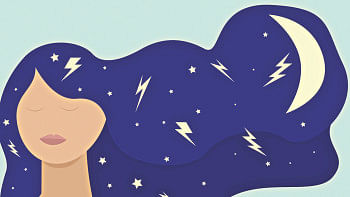The Curious Case of Dreams and Nightmares

When was the last time you had an incomprehensibly strange dream? Did you ever have any recurring dreams that always played out like a script? Why do we even have nightmares?
Dreams have been the subject of mystery for thousands of years. Rulers and warriors relied on them for wisdom, creatives looked upon them for inspiration, and scientists and philosophers have long debated their origin and significance. The fascination with dreams also led to the development of theories about their origin, much of which is still inconclusive.
Dream theorists
The most widely explored works in the world of dreams are by Sigmund Freud and Carl Jung, two of the most influential people in psychology. Freud's theory that dreams are "disguised fulfilments of repressed wishes" popularised the practice of dream interpretation. While Freud's theory mostly concerned itself with past experiences, Jung believed that dreams also have a "prospective function," offering glimpses into our future growth.
Since then, different theories have been proposed, including the idea that dreams are for emotion processing. But newer theorists look at it differently.
A recent study by Erik Hoel, a research assistant professor at Tufts University's Allen Discovery Center, suggest that the brain is like a machine learning model ‒ it gains proficiency from repetitive tasks but cannot apply said knowledge to other areas. Therefore, random variables or "noise" (in this case, dreams) have to be introduced to keep it fit. So, unusual dreams are the brain's way of adding noise to the thinking system. Hoel uses this theory to explain how sleeping on a problem can help to come up with a different solution in the morning!
Dreaming in different stages of the sleep cycle
In the mid-20th century, findings about Rapid Eye Movement (REM) sleep and non-REM (NREM) sleep shed new light on the science behind dreams.
Most dreams occur during the REM stage and are characterised by vivid imagery, intense emotions, and the feeling that they're real. On the other hand, NREM dreams involve friendlier emotions and are more conceptual.
A fascinating way of distinguishing the dreams of each sleep cycle stages is the representation of the self. Are you a passive observer of the story or an active participant? Do you find yourself being both? Are you even yourself or a different entity?
Nightmares and their link to trauma
Most theories suggest that nightmares are often result from waking psychological distress. This was exemplified during the lockdown of 2020, when people around the world reported vivid nightmares about the pandemic.
It is even more common to experience nightmares following trauma, and in the case of Post-Traumatic Stress Disorder (PTSD), the nightmare may be terrifyingly similar to the original event.
Some studies show that the purpose of nightmares is to let us test out various reactions because according to research, we are more inclined to facing frightening situations than to avoid them in our dreams. Reliving dangerous experiences while soundly asleep can lessen our fears and open up other brain regions crucial for creativity and decision-making.
Reference
1. TuftsNow (February 18, 2021). A New Theory for Why We Dream.
The author spends hours deciphering her dreams and finds more insight in them than what horoscopes can offer. Make the case for astrology at [email protected]

 For all latest news, follow The Daily Star's Google News channel.
For all latest news, follow The Daily Star's Google News channel. 









Comments